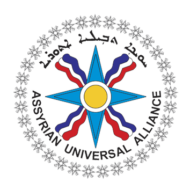Sub Commission on Prevention of
Discrimination and Protection Of Minorities Working Group on Indigenous Populations
Eighteenth session
24-28 July 2000
Intervention for Agenda Item 4:
Review of developments pertaining to the promotion and protection of human rights and fundamental freedoms of indigenous people:
Principal theme: “Indigenous children and youth”.
Madam Chair
I am attending this working group as a representative of the Assyrian people. They are the indigenous people of the land presently known as Iraq. They are also indigenous to parts of the lands within the countries currently comprisingTurkey, Iran and Syria. The largest population of Assyrians is within Iraq, where it is estimated that 2 million of our people reside. A further 1.5 million Assyrian people reside outside Iraq, in about 35 various countries, most of which are far from our homeland.
The reason for such a disproportionate scatter of our people from Iraq is because the Assyrians face grave abuses of their most fundamental human rights. This is not only because they live in a country, recognized for its human rights violations but also because they are the uncontested indigenous people of that land. I do not seek to use this forum for reference to, or quoting chapter and verse of, the specific evidentiary reports dealing with such violations. However I do seek permission to state generally, that our people continue to be the victims of ethnic religious cultural and linguistic persecution and genocide. More significantly, Assyrians, according to United Nations and other reliable international sources are being forcibly expelled from their homes, and thus forced to become refugees in overwhelming large numbers.
Abuses of Assyrians’ human rights in Iraq, the persecution for practicing our religion and culture, the prohibition to speak our ancient language and to maintain our rich history, have led to two fundamental problems for Assyrians that are particularly pertinent to the theme of children and young people.
Firstly, the situation faced by our people inside Iraq has meant that it is increasingly dangerous for parents to teach their children Assyrian, and to raise their children in accordance with our traditions, culture and religion. Assyrian children are not permitted to identify themselves as Assyrians, not even to have an Assyrian name. Secondly such religious, linguistic and cultural persecutions have meant that there is a significant movement of Assyrians out of Iraq.
It is notable that, around one half of the world’s Assyrians live outside their indigenous land. This exodus has serious implications for the long- term maintenance of our identity, language, history, religion and culture and May, in my respectful submission; result in the complete alienation of Assyrians from their indigenous land.
The consequences of these two factors on future generations are of grave concern to my people. While there is an obvious need to address the human rights violations within Iraq, I accept that such an outcome is beyond the means of this Working Group. However, I believe that there are some recommendations that this Working Group could make that would substantially assist in ensuring the survival and ongoing cultural and indigenous integrity of the Assyrian people as well as other indigenous peoples fleeing persecution from their homelands.
Firstly, I would like to respectfully suggest that the Working Group endorse a proposal to expressly recognize the unique status of indigenous peoples seeking refuge outside their traditional and indigenous lands.
To this end I recommend that the Draft Declaration on the Rights of Indigenous Peoples, when passed, should be applied retrospectively such as to, interalia, require States to acknowledge and respect the ongoing and territorial rights of refugees and their descendants who are indigenous, in their country of origin.
Without such retrospective application and recognition, the children and grandchildren of those Assyrians who have been forced to leave Iraq could be legally denied the right to access or return to their ancient ancestral lands. Without such recognition the capacity of Assyrian people to participate in any possible future decision making with respect to their lands will be further diminished.
Secondly, I respectfully recommend that there be a specific obligation for those States receiving significant numbers of indigenous refugees to assist in the maintenance of their language, history, religion and culture. The effect of this should be to make the obligations of States towards their refugee indigenous peoples similar to those they hold with respect to their own indigenous peoples.
Thirdly, it has long been accepted that indigenous peoples’ common experience of dispossession often manifests itself in common social needs. I recommend that it be noted that it is as important for States to address the specific social needs of migrant indigenous peoples as it is to address the social needs of indigenous peoples within their land.
I am hopeful that while these recommendations will not directly address the human rights issues confronting Assyrian people in Iraq, they will assist the longevity of our language, culture, history, religion and traditional values, and ensure that our children do not grow up in permanent isolation from their origins. Otherwise this could mean for Assyrians, the ultimate extinction of one of the richest and most ancient civilizations.
Thank you Madam Chair.
Assyrian Universal Alliance
Suzy David B.Ec; LLM.

